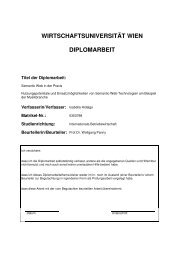Wirtschaftsuniversität Wien Magisterarbeit - SemanticLab
Wirtschaftsuniversität Wien Magisterarbeit - SemanticLab
Wirtschaftsuniversität Wien Magisterarbeit - SemanticLab
You also want an ePaper? Increase the reach of your titles
YUMPU automatically turns print PDFs into web optimized ePapers that Google loves.
6.1.6. Accessing SQLite databases<br />
Although the developed extension does not use SQLite databases, the topic should be<br />
briefly discussed for the sake of completeness. SQLite databases have been introduced<br />
with Firefox 3.0. They are easy to handle and can be queried using SQL. By using the<br />
mozStorage API one can directly open a connection to the database and query it by<br />
using JavaScript. The results can then be used to create XUL elements or simply by<br />
building content via JavaScript. [MDC09j] provides an example and more details.<br />
6.1.7. Accessing the local filesystem<br />
Once installed, an extension runs in the scope of the Firefox browser and has therefore<br />
much higher rights on the user’s computer than for example websites which are visited<br />
by using the browser. That means that extensions can access (and therefore also delete)<br />
all files and directories, even recursively! [MDC09k] provides a good overview about the<br />
API and how to use it, including some working examples.<br />
6.1.8. Using a integrated development environment (IDE)<br />
The author strongly recommends using an IDE such as Eclipse to develop Firefox extensions.<br />
It makes the development process a lot easier, for example by using Subversion<br />
(for version management) and Ant to automatically build the xpi-files. There are tools<br />
such as XulBooster (an Eclipse Plugin) 1 , the “Extension Developer’s Extension” (a Firefox<br />
Extension) 2 or the “Firebird/Thunderbird Extension Wizard” 3 available which also<br />
help in setting up a proper environment.<br />
6.1.9. Debugging Firefox<br />
For debugging Firefox extensions, one needs a JavaScript debugger such as Venkman 4<br />
which is Mozilla’s official JavaScript debugger. Although it provides useful insights,<br />
it sometimes cannot help developers, for example, finding out why extensions are not<br />
installed properly or why components are not loaded. This is due to the fact that<br />
Venkman itself comes as an extension and therefore is loaded the same time as other<br />
extensions are loaded and therefore cannot interrupt start-up processes. To accomplish<br />
this, developers have to run Firefox in debug-mode and set breakpoints in the Firefox<br />
source-code itself. More information on that issue can be found at the MDC. Another<br />
very important tool for debugging Firefox is a DOM Inspector. A DOM Inspector such<br />
as “DOMi”, Mozilla’s DOM Inspector 5 , lets you inspect the document structure of XUL<br />
windows and the browser. It is for example very useful to find out how to address XUL<br />
elements if the documentation is not clear in that point.<br />
1 http://cms.xulbooster.org<br />
2 http://ted.mielczarek.org/code/mozilla/extensiondev/<br />
3 http://ted.mielczarek.org/code/mozilla/extensionwiz/<br />
4 https://developer.mozilla.org/en/Venkman<br />
5 https://developer.mozilla.org/en/DOM Inspector<br />
57





